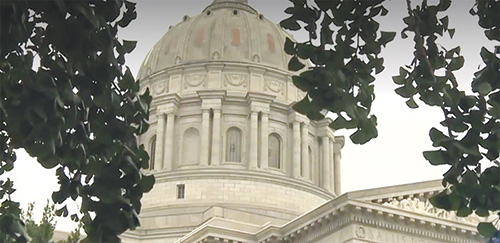
By TIM ROWDEN
Editor
Jefferson City – Efforts to undermine the Clean Missouri amendment approved by voters last fall died in the final week in the Missouri Legislature.
Amendment 1, also known as Clean Missouri, won approval from 62 percent of voters in November. Among other changes within the amendment, Clean Missouri overhauls the state’s redistricting process by putting a nonpartisan state demographer in charge of drawing the legislative districts.
Two pieces of legislation that would have changed that requirement floundered due to a combination of procedural bungling and lawmakers running out the clock arguing over a subsidy package for General Motors and – like their counterparts in Alabama – passage of a controversial anti-abortion bill aimed at forcing the issue before the U.S. Supreme Court.
‘DID THEY VOTE BECAUSE THEY DIDN’T LIKE THE SYSTEM?’ UM… YES
Despite voters overwhelming support for the Clean Missouri amendment, Rep. Dean Plocher (R-Des Peres) sponsored a bill that would have kept the current redistricting process, in which separate House and Senate committees decide how to draw district lines, and place the map-drawing question back on the ballot in the 2020 election.
Plocher said voters might not have fully understood the redistricting component amid the other ethics provisions in Clean Missouri.
“Did they have a choice, or did they vote because they didn’t like the system before and then they wanted ethics reform?” Plocher said in a nonsensical defense of the bill.
Plocher’s proposal won approval in the House but couldn’t make it out of the Senate Fiscal Oversight committee to be discussed on the floor. The proposal died in committee, which is made up of five Republicans and two Democrats, on a 2-2 vote along party lines because three of the Republicans missed the vote.
EFFORT TO HIDE RECORDS DIED OF EXPOSURE
Another measure that would have weakened Clean Missouri’s open records requirements, shriveled when exposed to the light.
Clean Missouri makes legislative records and proceedings subject to the state’s open records law, known as the Sunshine Law. The amendment, which was added when the House approved the bill in February, would keep lawmakers’ records from being public if they relate to “the deliberative decision-making process” of the legislature.
The amendment came under sharp criticism because it would keep a wide range of records out of public view – exactly the opposite of what voters demanded by passing Clean Missouri.
The original bill, sponsored by Rep. Shamed Dogan (R-Ballwin) would have extended some of the ethics restrictions in Clean Missouri to local government officials, but the measure failed to advance in the Senate.
Dogan said he plans to file the same legislation next year without the amendment.
(Information from Tom Coulter of the Missouri School of Journalism and the St. Louis Post-Dispatch.)


